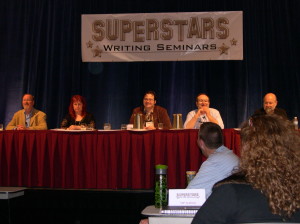When I re-started my writing career after a long hiatus, I had to figure out how to get back into the convention circuit. My base of operations shifted from upstate New York to the Denver area, so I didn’t know any local authors and I had no idea what conventions were in the area. Most importantly, I didn’t know how much it would cost.
I wasn’t too concerned with meeting new local authors, since I figured once I discovered where they lurked, we’d say hello. I trundled off to Google’s House to search through their drawers of data. I wanted to focus my search on conventions that involved the genres I was interested in. My horrible search string was this:
+convention +(denver|”colorado springs”) +(comic|book|literary|steam|”science fiction”|”sci fi”|”sci-fi”|fantasy|horror)
Yes, it’s written in geeky Google-ese. Translating it to English: Look for conventions in Denver or Colorado Springs for any of genres I listed. (If you’re interested in learning some tips for using Google to research things, see my Fictorians post on Advanced Google-Fu.)
I found plenty of local conventions, and my conventioneering career was underway. I reached out to the contacts I found on the con websites, offering my services on panels. The ones who asked me to sit on a panel received my highest priority, assuming they compensated me with a membership ticket. The ones who weren’t interested I put on a check-next-year list. Since I had no problems talking to a large audience (I used to teach at the college level, which helped me with my public speaking chops), programming directors heard that I “gave good panel.” I made a page on my author website that covered what panels I attended for which con, and I even made sure to include a list of fellow panelists. Sometimes it helps to name-drop.
After a few years, I was known to a large segment of the local con-going crowd. Most didn’t buy my books (I would be writing this from my island paradise if only that were true), but enough people remembered the Guy in the grey beard who made people laugh on panels. Folks would stop me in halls to say hello, and even the occasional celebrity/Guest of Honor would interrupt a conversation with a fan to say hello to me by name.
I figured I had saturated the local market with my branding efforts. I was wondering what to do at that point when my brilliant wife, Tonya L. De Marco, suggested that I start expanding my convention horizons.
Cue a Homer Simpson “D’oh!” That made sense.
I had to figure out where I could travel and remain in my budget. I decided on expanding east of Denver, for no other reason than there was more real estate in that direction. I didn’t want to fall off of the edge of my map, since it’s turtles all the way down. (Bonus geek points if you got that reference.)
I picked a couple of cities in Nebraska and replaced Denver and Colorado Springs in my Google search statement. It turned out there were several vibrant cons in Lincoln and Omaha. The first one I went to, CONStellation in Lincoln, wasn’t interested in me at first. I attended as a regular Guy just to experience what the con had to offer. The second convention I contacted, Omaha’s OSFest, was interested, and I was invited to attend as a panelist.
I’ve only been back to CONStellation once, where I shared a dinner table and conversation with Elizabeth Bear. I had so much fun at OSFest that I talked to the convention chair and helped to build an author panel track. I asked around my gaggle of Denver-based author friends and came up with a group that was interested in traveling to Omaha. The group returned for a couple of years until this year, when they were no longer interested in having us set up the author track (the new programming chair decided to go with an online submit-your-own panel methodology).
No worries, I thought. Look, there’s more unexplored territory on my map! Utah has a huge convention called Salt Lake Comic Con (SLCC), and there’s one in the other direction near St. Louis called Archon…
I opened my browser, found the names of the convention chairs, and fired off an email. I’m now attending SLCC as a Special Guest, and I’m waiting on a reply from Archon, one of the oldest fan-run conventions.
I’ll keep you informed as my horizons expand…


